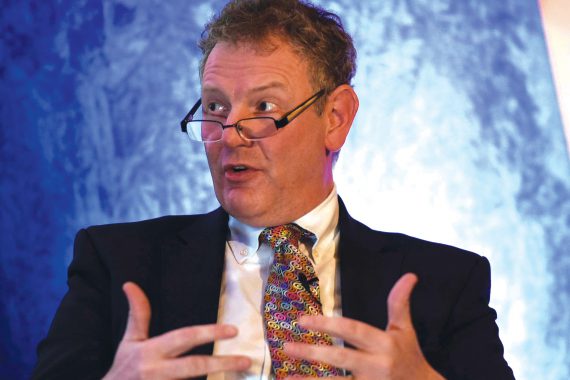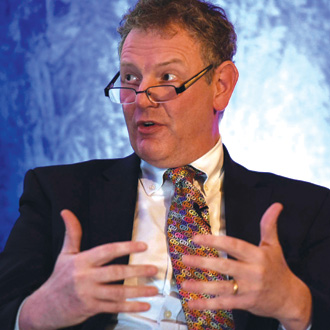Training chief: ‘I can’t guarantee money won’t be cut’


ian cumming 3×2 – online
Professor Ian Cumming is one of the most important figures determining the future of general practice in England. With recruitment remaining at the top of practices’ list of concerns, it is his organisation that is tasked with ensuring more medical graduates choose to become GPs.
Health Education England has a target of recruiting 3,250 doctors a year into GP training, as part of the Government’s pledge to provide 5,000 extra GPs by 2020. And there have been recent signs of improvement. The number of medical graduates applying for GP training has increased, smaller-scale initiatives to encourage GPs to work in under-recruited areas seem to be working and efforts to encourage people to re-apply to GP training after failing the original assessment have shown some success.
But overall GP numbers went down last year and HEE has to make significant cuts to its budget this year. Can Professor Cumming assure continued progress?
Can you give any update on efforts to recruit 5,000 extra GPs by 2020?
I’m not responsible for delivering 5,000 GPs on my own! Our energies have been focused on making sure people understand how attractive primary care and general practice can be as a profession.
We’re looking to start right the way back at medical school, dealing with some of the misperceptions that are still perpetuated in some of our medical schools – that general practice is something you do if you’re no good at anything else, which is fundamentally flawed as far as we’re concerned.
We’re not recruiting 3,250 GP trainees a year yet, which is the target we’re aiming for. Last year we recruited about 3,000 doctors into GP training places, which is about 10% up on the previous year. Certainly since HEE has been around, this is the largest number we’ve recruited, but we’ve got some way to go – another 7% or 8% – to get to the 3,250.
What will you be doing over the next year to ensure you do reach that figure?
It’s a combination of more of the same, so this year we will have more than 60% of foundation doctors spending time in general practice, which is quite a big forward step. That does have a very significant impact in terms of people’s understanding of what general practice is about. We’re offering extra training to people who have tried to enter general practice, but not made it through the recruitment process having missed it by a small amount. We give them some additional training and they reapply the following year. About 60% of people who have been through that programme get into GP training in the subsequent year, which is positive.
We’ve also been running some targeted enhanced recruitment initiatives, looking at how can we get GP trainees into areas that, in some cases, have never had a GP trainee, or in other cases haven’t had one in the past three years. We offered 122 of those last year and we filled 105, which we’re really quite pleased about. Many of those 105 people, we hope, will end up working as GPs in those areas.
The Government has said it wants to put a GP in every A&E department. Have you estimated how many more GPs we’d need for that?
No, we are working with NHS England at the moment in terms of what the demand is likely to be for GPs in the future – and it’s only going in one direction. It’s certainly not going to come down.
The commitment to grow the workforce by 5,000 is the objective that we’ve got at the moment, and that is by 2020. We are now looking at what we’ll actually need beyond that, which takes us through into the next parliament, into the next spending review period.
There’s been talk of new medical schools in view of the increase in medical students in England. What are the implications for general practice?
The health secretary announced at the Conservative Party Conference last year that there would be an increase of 1,500 medical students in England. The proposal at the moment is for 500 to go to existing medical schools and they start next year. The other 1,000 would be subject to a bidding process, which could include aspirant medical schools.
In terms of where these medical school places should be allocated, we have been clear we want to look particularly at under-doctored areas, and at widening participation, social mobility and access to undergraduate medical degrees. We need to be convinced the curriculum is designed to offer students significant exposure to primary care.
This all sounds fantastic but how does this fit with the 30% budget cuts you’ve got planned?
There has been some misunderstanding in terms of that 30%, so thank you for the opportunity to put that right. Our organisation receives effectively three sums of money. We receive a sum for the running costs of the organisation. That sum was reduced – in common with that of all other arm’s-length bodies – by 25% in last year’s spending review.
We then have the biggest chunk of money, about £4.9bn, for activities such as commissioning undergraduate and postgraduate education, paying the salaries of doctors in training, and ongoing work developing CPD activities.
And then we have a third area of resource – educational support funding. This supports the postgraduate deans and their teams, plus all the back-office functions around things like recruiting trainees into training programmes. And what we’ve said is that we want to look and see what efficiencies we can take out of that overall function.
So the cut isn’t 30% out of HEE’s budget, it is 30% out of how much money we spend on back-office functions and on support functions to see how we can make that more efficient. I can absolutely put hand on heart and say that I have not yet seen a single proposal come back into our organisation from any of our teams about how we do that; absolutely no decisions have been made.
Can you guarantee that no money will be cut from GP training?

Ian Cumming – online 330×330
From actual GPs receiving training, we are not looking at targeting that funding at all.
How about GP trainers?
We haven’t had any proposals yet. I can’t guarantee that though, because we need to look at what we’re doing to see if there’s scope for doing that differently or better. I would give you the same answer if you asked about orthopaedics, radiology, pathology or anything else. Our key job is to produce doctors of the highest-possible quality with the best-possible training. We aren’t going to sacrifice that.
I’m sure there are lots of people in the Pulse Live audience who are struggling to recruit a partner, a sessional GP or other practice staff. What can you say to them if they’re having problems meeting the needs of their patients because of recruitment difficulties?
We need to work with the profession to help convince young people that, although life is tough for GPs at the moment – and I fully accept that you are under unprecedented levels of pressure and demand – this is a very rewarding career for them. We need to convince them that they actually want to invest a significant amount of their own time and effort in training to become a GP, because if we can get the numbers coming through, then we will actually start to reduce the pressure.
I’m not saying we should say everything is wonderful when we know it’s really tough. Equally, we need to be telling young people this is a rewarding career. We need to get the additional workforce for which NHS England is identifying resources and will identify training to help make it better.
Finally, isn’t there a risk if you have more people spending more time in general practice with stressed, overworked partners, they will actually be put off?
That comes back to my earlier point. I was asking Foundation Year trainees how many were interested in a career in emergency medicine, and the answer was zero. They said they’d had such a shocking experience in the jobs they’d done in the emergency department, why would they want to work in that environment? Now we’ve turned that around.
But we do have to address the issue of medical students or foundation doctors being put off by how pressurised primary care is. We’re trying to design a healthcare system that’s delivered in the community within reach of hospital when necessary so we are going to need a greater percentage of people choosing to work in the community as part of their role as we have done in the past. And that’s partly down to training programmes but it’s also down to people actually having the confidence that this is a meaningful career for them.
CV
Age
52
Career
2006-2009
Chief executive, North Lancashire Teaching PCT
2009-2011
Chief executive, NHS West Midlands
2011-2012
NHS national director for quality
2012-present
Chief executive, Health Education England
Pulse July survey
Take our July 2025 survey to potentially win £1.000 worth of tokens











